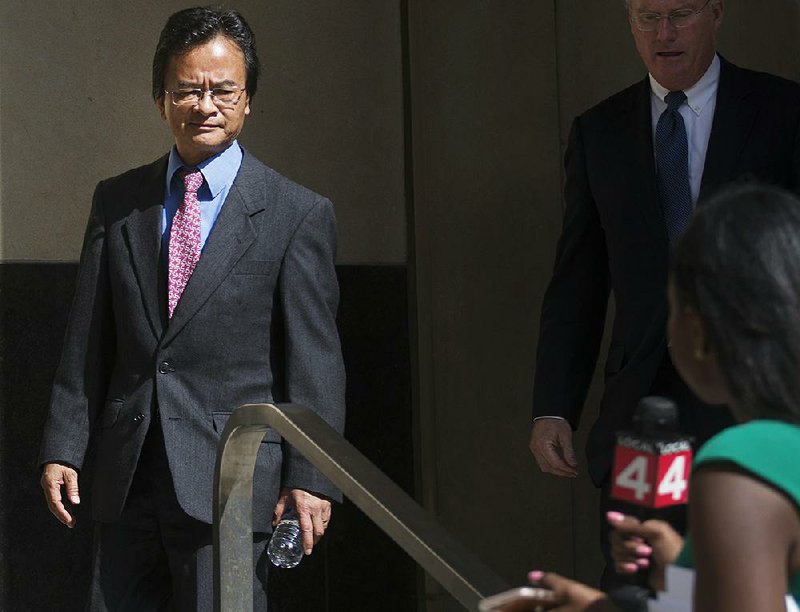DETROIT -- A Volkswagen engineer who had a key role in the company's diesel emissions scandal was sentenced Friday to more than three years in prison and a $200,000 fine, a steeper punishment than prosecutors requested.
James Robert Liang, 63, knew the German automaker was cheating and worked to cover it up, U.S. District Judge Sean Cox said during the sentencing hearing in Detroit. The judge imposed a 40-month prison sentence.
"The conspiracy perpetrated a massive ... and stunning fraud on the American consumer that attacked and destroyed the very foundation of our economic system," Cox said.
Liang, who faces deportation to Germany upon his release from prison, declined to speak on his own behalf Friday. Prosecutors had requested a 36-month prison term and a $20,000 fine.
Prosecutors said Liang was aware that Volkswagen used software to cheat U.S. emission rules on nearly 600,000 diesel vehicles. His lawyer said he's not "greedy or immoral" but followed orders to keep his job and support his family.
"What occurred here was wrong," defense attorney Daniel Nixon said. "But he wasn't the mastermind. He was not motivated by greed."
Liang pleaded guilty last year to one count of conspiracy to defraud the government and agreed to cooperate with investigators. Liang had asked the judge to consider a sentence of probation and 1,500 hours of community service.
He is one of two Volkswagen employees to plead guilty, although others charged in the case are in Germany and out of reach.
Volkswagen and U.S. environmental regulators announced agreement last month on a plan for the automaker to fix most of the diesel cars involved in the emissions cheating scandal.
Volkswagen has admitted that the cars were sold with illegal software programmed to turn on emissions controls during government lab tests and turn them off while on the road. Investigators determined that the cars emitted more than 40 times the legal limit of nitrogen oxide, which can cause respiratory problems.
The company got away with the scheme for seven years until independent researchers reported it to government regulators.
About 11 million vehicles worldwide were affected, and provisions for costs related to penalties and vehicle repairs amount to $26.7 billion.
Volkswagen operated a top-secret site at its sprawling headquarters to test the diesel technology at the heart of the emissions-cheating scandal, reflecting the lengths those involved went to conceal their actions, people familiar with the matter told Bloomberg News.
Some engineers used the research facility in Wolfsburg, Germany, to upload the software that manipulated regulatory emissions checks, one of the people said. The test stand, just a stone's throw from the main office tower where top executives sit, had unusually tight security rules that prevented access to those not involved in the project, including high-level employees who could enter all other development sites, another person said. The people spoke on condition of anonymity.
Volkswagen declined to comment on internal facilities and findings into investigations into the roots of the manipulations.
While Volkswagen has said the manipulation was restricted to a small group of rogue engineers, the existence of a dedicated test site, which hasn't been previously reported, shows that that work occurred in close proximity to the offices of top executives and raises fresh questions about what management knew about the illicit conduct. Former and current senior executives have denied allegations that they were aware of large-scale cheating.
The roots of the cheating date back to 2006, according to a plea agreement Volkswagen signed with U.S. authorities in January. Engineers struggled at the time to develop a diesel engine that could meet stricter U.S. emissions standards without jeopardizing performance.
The unusual security arrangements at the site were in effect from at least 2006 through 2008, the people familiar with the matter said. The diesel engines that were equipped with the software were fitted in cars from model years 2009 to 2015.
While especially tight security measures over several years at an engine-development facility might support Volkswagen's claim that the manipulation was restricted to a small group, there are doubts about the official version. In the U.S. plea agreement, the manufacturer stated that 40 employees at its Volkswagen and Audi brands deleted thousands of documents right after U.S. authorities uncovered the illegal engine software. Volkswagen was able to recover most of these files.
Information for this article was contributed by The Associated Press and by Christoph Rauwald and Eyk Henning of Bloomberg News.
Business on 08/26/2017
